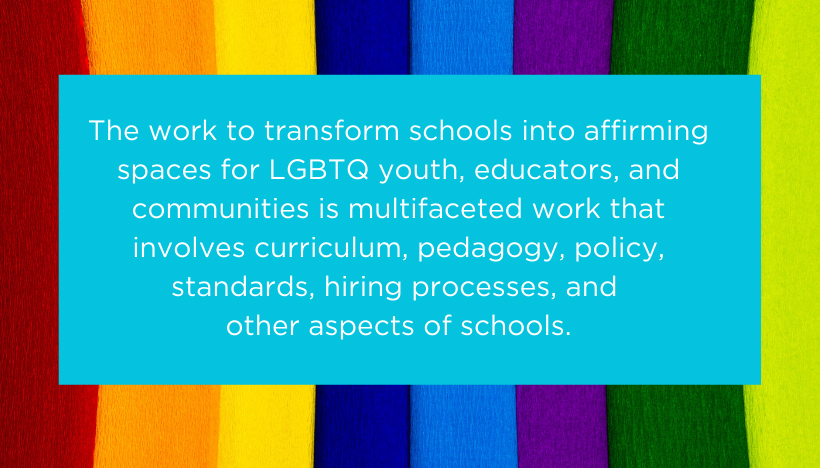From the NCTE LGBTQ Advisory Committee
This blog post was written by Cody Miller, Chair of the NCTE LGBTQ Advisory Committee.
In the past few years I’ve noticed a warming (and often humorous) trend on social media: Queer youth creating memes that speak to the ways their English teachers supported, affirmed, and loved them. While not an official name, I refer to the collection of memes as the “English teachers support queer youth” genre.
Examples of the meme are abundant: screenshots from video games, promotional photos from actors, stills from reality shows, celebrity pictures at political events, stock images of bespectacled readers, and the list goes on. A search on Twitter with the words “gay” and “English teacher” will provide the depth of the meme’s reach. The message behind the meme transcends the specific popular cultural texts used to construct the meme. And that message is that English teachers can work to make their classrooms affirming and loving spaces for students even when broader school structures remain entrenched with homo-, trans-, bi-, and queerphobia.
How can we make our own English classrooms spaces that live up to the ideals of the “English teachers support queer youth” meme? Some questions to consider in our classroom and practice that can guide our work include:
- Where are queer narratives and voices present in the curriculum? First, do queer narratives exist in your curriculum? And if so, where? How do we position queer narratives? Are they in book club choices or literature circles? Do we use queer narratives as mentor texts for the whole class? References to queerness that are vague or disputable in canonical works are not enough. We need narratives that center queer people.
- How representative of queer communities is your curriculum? Too often, cisgender, white gay male narratives become a stand-in for “LGBTQ texts,” thus erasing the diversity of LGBTQ communities. Popular texts like Simon v. the Homo Sapiens Agenda and its cinematic adaptation Love, Simon are worthy of space in classrooms, but they cannot be the sole texts. Titles like They Both Die in the End by Adam Silvera, If You Could Be Mine by Sara Farizan, This is Kind of an Epic Love Story by Kacen Callender, Like a Love Story by Abdi Nazemian, Trans Mission: My Quest to a Beard by Alex Bertie, and I Wish You All the Best by Mason Deaver are foundational pieces for an LGBTQ-affirming classroom library.
- What queer educators do you read and learn from? It’s important to include LGBTQ titles in your classroom library. Equally important is to consider how you’re learning to teach those titles. Teachers also need to read and learn from queer writers. Professional learning titles like Reading the Rainbow: LGBTQ-Inclusive Literacy Instruction in the Elementary Classroom by Caitlin Ryan and Jill Hermann-Wilmarth, Beyond Borders: Queer Eros and Ethos (Ethics) in LGBTQ Young Adult Literature edited by Darla Linville and David Lee Carlson, Teaching, Affirming, and Recognizing Trans and Gender Creative Youth: A Queer Literacy Framework by sj Miller, and Troubling Education: Queer Activism and Anti-Oppressive Pedagogy by Kevin Kumashiro would make for important additions to English teachers’ professional reading libraries.
These questions are by no means exhaustive. The work to transform schools into affirming spaces for LGBTQ youth, educators, and communities is multifaceted work that involves curriculum, pedagogy, policy, standards, hiring processes, and other aspects of schools. These questions do represent beginning steps for teachers who want to live up to the ideals of the meme.
By no means do I want to suggest that the meme is representative of all English teachers. Unfortunately, the same Twitter search I mentioned earlier also provides examples of English teachers using their position to harm and marginalize LGBTQ youth. These tweets speak to the progress we still have to make as a profession.
Our committee has written multiple blog posts on pedagogical and curricular suggestions for affirming LGBTQ youth during 2019. We will continue publishing blogs with more ideas in the upcoming months. It’s my hope that our teaching will inspire more creative memes from queer youth.

Cody Miller is an assistant professor of English education at the College at Brockport, State University of New York. During his seven years as a high school English teacher and in his current role, he positions texts as vehicles to discuss broader socio-political issues in students’ lives and worlds. He can be reached at hmiller@brockport.edu or on Twitter @CodyMillerELA.

